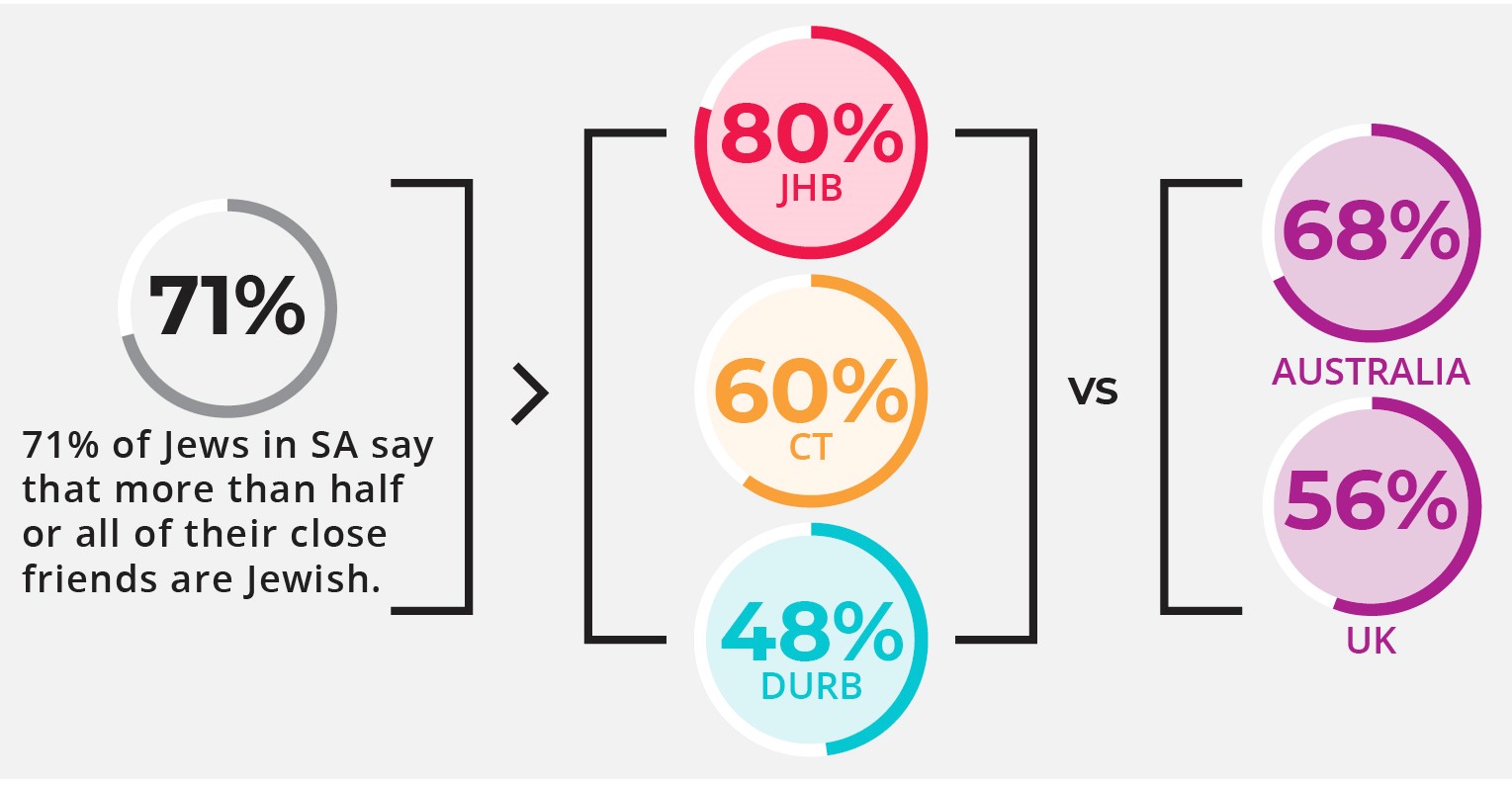
SA

Strong Jewish identity, greater religious affiliation
JORDAN MOSHE
More than 80% of South African Jewry is proud to be Jewish, and a majority continues to perpetuate a Jewish way of life, from performing circumcisions to fasting on Yom Kippur.
While the study found a remarkably high level of Jewish consciousness among the South African population, it pointed out that Jewishness and religious observance aren’t necessarily synonymous in South Africa. Jewish identity is a “multi-dimensional concept and no single measure can describe it satisfactorily”, according to the study.
In terms of age, however, the pattern is striking. Whereas older people are more inclined to identify ethnically with Judaism, younger respondents show greater agreement with statements relating to religious belief.
This bodes well for the future of our community, Chief Rabbi Dr Warren Goldstein told the SA Jewish Report recently.
“The global trend in the diaspora is for Jewish identity, affiliation, and practice to wane gradually with each succeeding generation,” he said. “South Africa has reversed that trend. Not only is Judaism not waning among the younger generation, in fact, it’s getting stronger. Indeed, the proportion of Jewish South Africans who describe themselves as committed, practicing, proud Jews is highest among those between the ages of 18 and 40.”
Goldstein believes there is so much that is heart-warming and positive about the findings of the survey. “Once again, it has emerged that compared with other English-speaking diaspora communities, South Africa has the lowest rates of intermarriage and assimilation, and the highest rates of Jewish identity, Jewish practice, beliefs and values, and Jewish affiliation,” he says. “The high proportion of Jews in South Africa who live with mitzvot (commandments) like Pesach and Yom Kippur and who also keep kosher and Shabbat is particularly noteworthy.”
The survey also identified an increase in both Orthodox and progressive observance. Almost 30% of respondents identified as Orthodox, and while traditional identification remains high at 32%, the study found a marked increase in progressive identity and a thinning of the traditional middle-ground.
Dr David Graham, the author of the report, said, “Times have changed, and individualism and the centrality of personal choice have become important aspects of modern thinking and behaviour, hence people are increasingly choosing to step outside this middle ground.”
He said that some move along more Orthodox paths because they feel that it’s more meaningful or authentic for them. For the same reasons, however, some choose more secular pathways which they, too, view as more authentic. Still, he points out that the process is gradual, cannot be overstated, and that traditional is still the largest, self-identifying group.
Given the diversity of Jewish identity, the survey sought to determine the extent to which respondents felt accepted by the Jewish community. Sixty-seven percent said they felt well accepted, but less religious respondents or those adhering to non-Orthodox denominations reported feeling less accepted, although they were in a minority.
However, Rabbi Greg Alexander of the Cape Town Progressive Jewish Congregation said that in spite of their differences, progressive Jews do feel part of the broader Jewish community.
“As long as there have been different denominations there have been tensions between them,” he said. “That’s not to say that there aren’t also many examples of collaboration and acceptance, but historically, Orthodoxy has been the denomination that most South African Jews affiliate to, even if their own beliefs and practices have been more progressive.”
Alexander said that many progressive Jews participate in the wider Jewish community through communal organisations like the CSO (Community Security Organisation), the South African Jewish Board of Deputies, the South African Zionist Federation, and youth movements without experiencing any lack of acceptance.
“There are also many who do experience a feeling of Orthodox Jews looking at their practice as inauthentic, just as you will often hear complaints of modern Orthodox Jews experiencing something similar from Haredi Jews.
“In my opinion, this is such a waste of energy. All of us should just get on with what we do, and focus on how we can better serve Hashem and our communities. The best way to show that your Judaism is authentic is to practise it passionately and proudly.”
This is clearly something an overwhelming majority of South African Jews of all denominations do well now, and will continue to do in the future, something Graham is cautiously optimistic about.
“I believe one of the main reasons Jewish communal life is thriving to the extent we see is because the barriers to assimilation are much higher in South Africa than other places,” he says. “In the United States, Jews aren’t very different to the American mainstream, and are seen as social equals. For better or worse, such ‘acculturation’ is a key step towards assimilation. But that’s not the case in South Africa where there are massive barriers in terms of economics, education, language, location, and culture.
“It seems unlikely these will be lowered anytime soon, so if religious life can be sustained up until now, why not going forward?”
Goldstein, too, is positive, believing we need to approach the survey with an open mind, drawing strength and inspiration from the positive findings, and looking squarely at the challenges that have been identified. In doing so, we can chart a path for the future.
“We need to look at the areas where we are doing well as a community and draw encouragement from our strengths and resolve to deepen and reinforce them,” he said. “At the same time, we need to confront the areas where we are falling short with honesty, and devote concerted effort to turning them around.
“Ultimately, in doing so, I believe this survey can be a catalyst for greater strength. Most importantly, we must continue to work together as one community with unity.”




